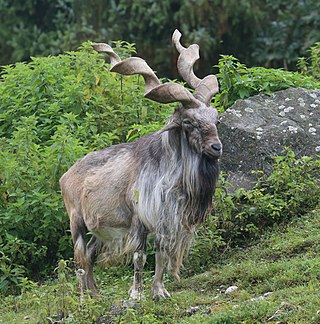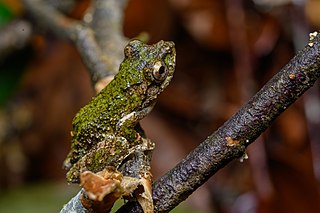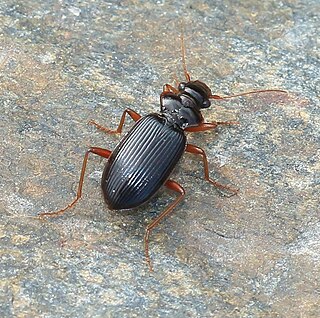
The markhor is a large wild Capra (goat) species native to South Asia and Central Asia, mainly within Pakistan, the Karakoram range, parts of Afghanistan, and the Himalayas. It is listed on the IUCN Red List as Near Threatened since 2015.

Blanford's fox is a small fox native to West Asia, Central Asia and parts of South Asia. It is listed as Least Concern on the IUCN Red List.

The argali, also known as the mountain sheep, is a wild sheep native to the highlands of western East Asia, the Himalayas, Tibet, and the Altai Mountains.

The Asian giant softshell turtle, also known commonly as Cantor's giant softshell turtle and the frog-faced softshell turtle, is a species of freshwater turtle in the family Trionychidae. The species is native to Southeast Asia. The species is critically endangered and in the 20th century has disappeared from much of its former range.

The Egyptian mongoose, also known as ichneumon, is a mongoose species native to the tropical and subtropical grasslands, savannas, and shrublands of Africa and around the Mediterranean Basin in North Africa, the Middle East and the Iberian Peninsula. Whether it is introduced or native to the Iberian Peninsula is in some doubt. Because of its widespread occurrence, it is listed as Least Concern on the IUCN Red List.

Panthera pardus tulliana, also called Persian leopard,Anatolian leopard, and Caucasian leopard in different parts of its range, is a leopard subspecies that was first described in 1856 based on a zoological specimen found in western Anatolia. It is native to the Iranian Plateau and the surrounding region from eastern Anatolia and the Caucasus to the Hindu Kush, where it inhabits foremost subalpine meadows, temperate broadleaf and mixed forests and rugged ravines at elevations of 600 to 3,800 m. It preys mostly on ungulates reliant on these habitats.

Kurixalus bisacculus is a species of frog in the family Rhacophoridae. It is found in Southeast Asia and southern China. Because of confusion with other species, the distribution is not well mapped but includes Thailand, Cambodia, Laos, Vietnam, and China. Populations from Hainan were formerly treated as a separate species, Rhacophorus hainanus, but molecular data suggest they are conspecific with Kurixalus bisacculus.

The grey-necked bunting, sometimes referred to as grey-hooded bunting is a species of bird in the family Emberizidae. It breeds along a wide distribution range from the Caspian Sea to the Altai Mountains in Central Asia and winters in parts of Southern Asia. Like other buntings it is found in small flocks.

Aleosteus is an extinct monospecific genus of arthrodire placoderm fish of the Early Devonian period. The type species Aleosteus eganensis was described in 2000, and was found in the Late Emsian strate of the Sevy Dolomite Formation, in the Egan Range of east-central Nevada, USA. Almost complete fossils belong to juvenile and adult specimens and show a short and broad skull, posteriorly concave.

Leistus is a genus of ground beetles in the family Carabidae. There are more than 250 described species in Leistus, found in the Holarctic.
Itilochelys is an extinct genus of sea turtle in the family Cheloniidae containing the single species Itilochelys rasstrigin. The species is known only from the Early Paleocene, Danian stage Rasstrigin 2 locality, Dubovsky District, Volgograd Oblast, Russia.
Lachana selenophora is a species of moth of the subfamily Lymantriinae. It is found in alpine habitats on the high mountains in Central Asia.
Lachana sincera is a species of moth of the subfamily Lymantriinae. A single example was found in 1909 at high elevations in the Wakhan range of the Pamir Mountains of Tajikistan and is only known to have seen again since in 1961. This was also in the area, making it provisionally endemic to southern Gorno-Badakhshan.

The Turkestan lynx, also known as the Central Asian, Tibetan or Himalayan lynx, is a subspecies of the Eurasian lynx distributed in Central Asia and in the Himalayas.
Leistus montanus is a species of ground beetle native to Europe.
Leistus lebardicus is a species of ground beetle found in Lebarde, Georgia. It is in the subgenus Leistus.
Leistus trabzonicus is a species of ground beetle found south of Uzongöl, Trabzon Province, Turkey. It belongs to the subgenus Leistus.
Leistus rezabkovae is a species of ground beetle found in the Gansu Province, China. It belongs to the subgenus Evanoleistus.
Leistus tanaognathus is a species of ground beetle found in the Yunnan Province, China.
Leistus nanshanicus is a species of ground beetle that can be found in the Gansu Province, China. It belongs to the subgenus Evanoleistus.










